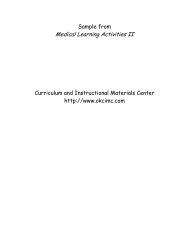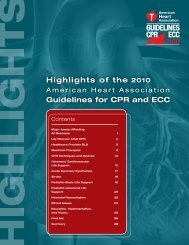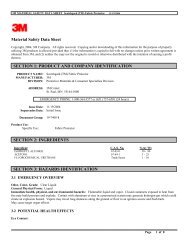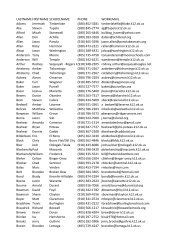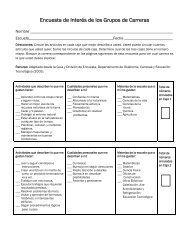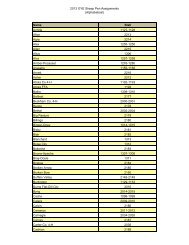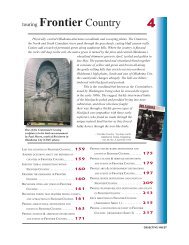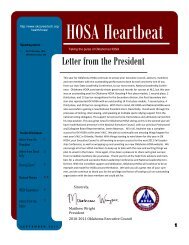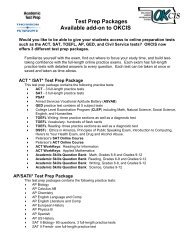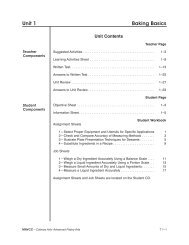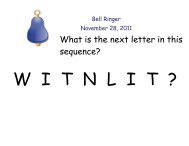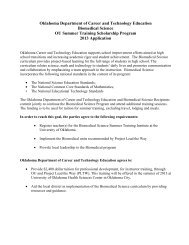Animal Nutrition and Digestion (PDF file, 5.95 MB)
Animal Nutrition and Digestion (PDF file, 5.95 MB)
Animal Nutrition and Digestion (PDF file, 5.95 MB)
You also want an ePaper? Increase the reach of your titles
YUMPU automatically turns print PDFs into web optimized ePapers that Google loves.
Agriscience Principles <strong>and</strong> Applications<br />
s<br />
Vitamins<br />
Vitamins are essential for normal body functions<br />
such as digestion, cell metabolism, growth, <strong>and</strong><br />
reproduction. Like minerals, they are also needed<br />
in relatively small quantities. Vitamins help in<br />
tooth <strong>and</strong> bone formation, assist the body in<br />
fighting stress, <strong>and</strong> prevent infection in the body.<br />
Vitamins can be obtained from many different<br />
sources such as forages, hay, <strong>and</strong> cereal grains. Just<br />
as in minerals, it is important for the producer to<br />
provide the appropriate vitamins.<br />
B-complex vitamins are necessary for growth<br />
<strong>and</strong> reproduction. The B-complex vitamins<br />
include thiamine, riboflavin, niacin, pyridoxine,<br />
pantothenic acid, biotin, folic acid, benzoic acid,<br />
choline, <strong>and</strong> B-12. The B-complex vitamins<br />
help many body functions such as red blood cell<br />
maturation (vitamin B-12) <strong>and</strong> energy metabolism<br />
(riboflavin).<br />
Symptoms of Nutrient<br />
Deficiencies<br />
What happens when an animal doesn’t get enough<br />
of a specific nutrient? Symptoms of nutrient<br />
deficiencies range from a variety of diseases <strong>and</strong><br />
health problems to fatality.<br />
The symptoms of water deficiency include<br />
weakness, reduced feed intake, weight loss,<br />
eyes that appear sunken in, <strong>and</strong> lack of saliva<br />
production. Water deficiency can ultimately cause<br />
death if the animal does not receive adequate<br />
amounts of water.<br />
Vitamins are found in a variety of<br />
feed sources.<br />
Jupiter Images<br />
Vitamins are fat soluble or water soluble. Watersoluble<br />
vitamins are dissolved in water, <strong>and</strong> fatsoluble<br />
vitamins are dissolved in fat. Fat-soluble<br />
vitamins include vitamins A, D, E, <strong>and</strong> K. Vitamin<br />
D is necessary for bone development, <strong>and</strong> it is<br />
produced in the animal’s body. In order to produce<br />
vitamin D, the animal must be in sunlight for a<br />
portion of the day. Some of the main benefits of the<br />
other fat-soluble vitamins include blood clotting<br />
(vitamin K), reproduction <strong>and</strong> muscle development<br />
(vitamin E), healthy eyes, <strong>and</strong> preventing infection<br />
(vitamin A).<br />
Water-soluble vitamins include vitamin C <strong>and</strong><br />
the B-complex. Vitamin C is needed for teeth <strong>and</strong><br />
bone formation, <strong>and</strong> the prevention of infections.<br />
Lack of energy is often a first symptom of<br />
carbohydrate deficiency. Other symptoms of<br />
carbohydrate deficiency include weight loss,<br />
poor growth rates, loss of fat, <strong>and</strong> an unthrifty<br />
appearance. <strong>Animal</strong>s that lack carbohydrates for<br />
an extended time can face starvation <strong>and</strong> possibly<br />
death.<br />
Nutrient deficient animals can quickly become sick.<br />
USDA-ARS Photo<br />
9



